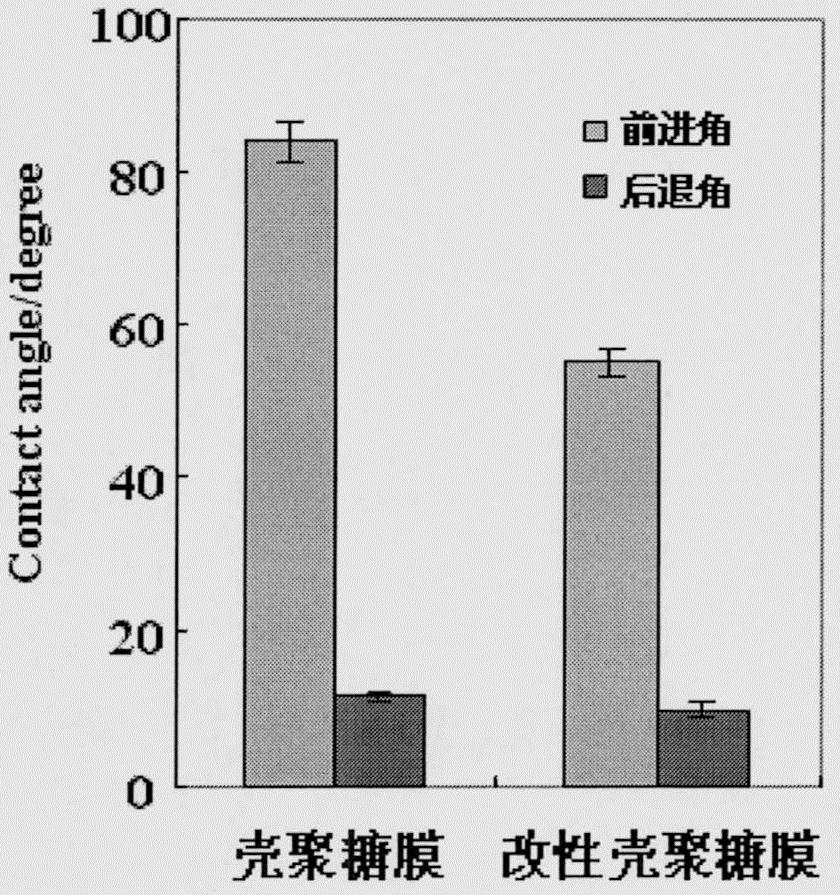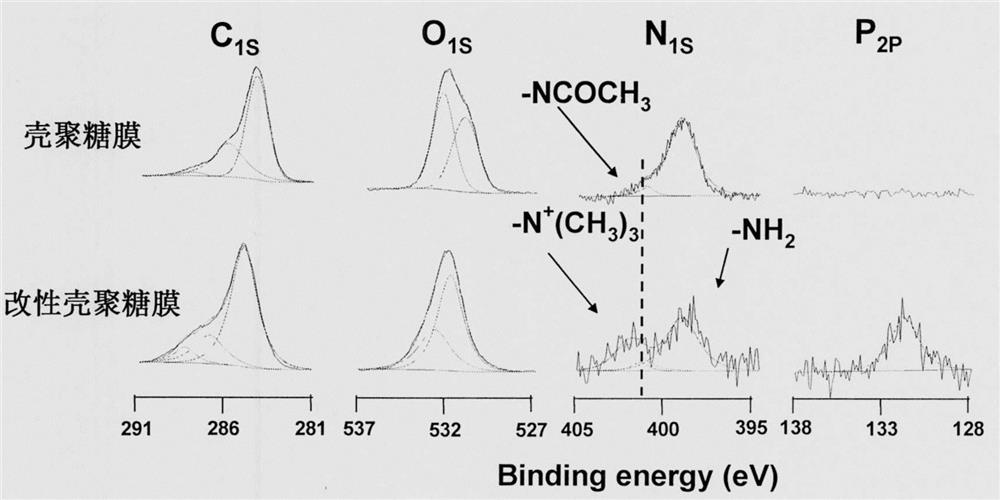Preparation method of biomimetic coating containing epoxy phosphorylcholine polymer and dopamine cross-linked adhesion
A technology of epoxy phosphoryl choline and phosphoryl choline, applied in the direction of coating and the like, can solve the problems of harsh conditions in the synthesis process, difficult to store, limited application scope and the like
- Summary
- Abstract
- Description
- Claims
- Application Information
AI Technical Summary
Problems solved by technology
Method used
Image
Examples
Embodiment 1
[0027] Weigh 16mmol 2-methacryloyloxyethyl phosphorylcholine and 4mmol glycidyl methacrylate, use 0.1mmol azobisisobutyronitrile as initiator, methanol and tetrahydrofuran as solvent, under nitrogen protection, 70 ℃ polymerization reaction for 24 hours, dialyzed after the reaction, and then freeze-dried at -50 ℃ to obtain the epoxy-containing phosphorylcholine polymer.
[0028] Using a 400MHz NMR instrument to D 2 O is the hydrogen NMR of the solvent test polymer. There is no peak at 5-7ppm, indicating that there is no residual monomer in the resulting copolymer, and the polymer has been successfully synthesized, with 3.28ppm being -N + (CH 3 ) 3 Characteristic peaks, 0.9-2.2ppm are the peaks of methylene and side chain methyl groups on the main chain to calculate the polymer composition, and it can be known that the polymer composition is basically consistent with the feed ratio.
[0029] The epoxy-containing phosphorylcholine polymer prepared in this example was prepared...
Embodiment 2
[0033] Weigh 14mmol 2-methacryloyloxyethyl phosphorylcholine and 6mmol glycidyl methacrylate, use 0.1mmol azobisisobutyronitrile as initiator, methanol and tetrahydrofuran as solvent, under nitrogen protection, 70 ℃ polymerization reaction for 24 hours, dialyzed after the reaction, and then freeze-dried at -50 ℃ to obtain the epoxy-containing phosphorylcholine polymer.
[0034] The epoxy-containing phosphorylcholine polymer prepared in this example was prepared into 2 mL, 2 mg / mL methanol solution, and then 1 g of dopamine was added and mixed evenly. Then the above-mentioned mixed solution containing epoxy-containing phosphorylcholine polymer and dopamine is drop-coated on the chitosan surface. Among them, the mixed solution of phosphorylcholine polymer containing epoxy and dopamine is dripped and dried, and then placed in a pH=8.5 Tris-HCl aqueous solution at 45°C for 12 hours, so that the amino group in dopamine and the amino group on the surface of chitosan film are combine...
Embodiment 3
[0036] Weigh 19mmol 2-methacryloyloxyethylphosphorylcholine and 1mmol glycidyl methacrylate, use 0.1mmol azobisisobutyronitrile as the initiator, methanol and tetrahydrofuran as the solvent, under nitrogen protection, 70 ℃ polymerization reaction for 24 hours, dialyzed after the reaction, and then freeze-dried at -50 ℃ to obtain the epoxy-containing phosphorylcholine polymer.
[0037] The epoxy-containing phosphorylcholine polymer prepared in this example was prepared into 2 mL, 5 mg / mL methanol solution, and then 0.8 g of dopamine was added and mixed evenly. Then the above-mentioned mixed solution containing epoxy-containing phosphorylcholine polymer and dopamine is drop-coated on the chitosan surface. Among them, the mixed solution of phosphorylcholine polymer and dopamine containing epoxy is dripped and dried, and then placed in pH=8.5 Tris-HCl aqueous solution at 95 ° C for 2 hours, so that the amino group in dopamine and the amino group on the surface of chitosan film are...
PUM
 Login to View More
Login to View More Abstract
Description
Claims
Application Information
 Login to View More
Login to View More - R&D
- Intellectual Property
- Life Sciences
- Materials
- Tech Scout
- Unparalleled Data Quality
- Higher Quality Content
- 60% Fewer Hallucinations
Browse by: Latest US Patents, China's latest patents, Technical Efficacy Thesaurus, Application Domain, Technology Topic, Popular Technical Reports.
© 2025 PatSnap. All rights reserved.Legal|Privacy policy|Modern Slavery Act Transparency Statement|Sitemap|About US| Contact US: help@patsnap.com


